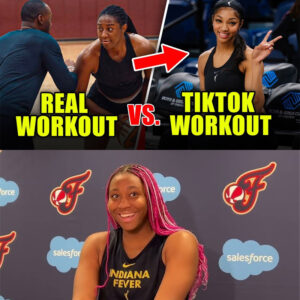on:
“I’m just so happy. I know the work I put in.
Coming into this league, so many people doubted me and didn’t think my game would translate and I wouldn’t be the player that I was in college or better or would be worse and wouldn’t be where I am right now.
But I trusted the process and I believed and I’m thankful …
I can’t thank my teammates and my coaches enough for just believing in me and trusting me. I know all of them are going to come to Phoenix and support me. So I’m really happy right now.”
Look, these are both young players: 22 years old.
I cringe to think of some things I might have said on the spot at that age, and I’m grateful there were never any cameras and microphones around.
They’re both learning and growing, and people are rightfully eager to see how they and their teammates, can develop both women’s basketball and the popularity of women’s sports in general.
Among the things they’ll learn are two points that rank right up there with, “praise in public; criticize in private.”
In short, successful leaders learn (a) to demonstrate humility about their own accomplishments and (b) to express pride about their teammates’ accomplishments.
There are exceptions — for example, a leader being boastful to motivate his or her team, or even intimidate a rival team. But, they need to be intentional exceptions.
Anyway, neither Clark nor Reese is the number 1 player in the WNBA. They might be someday, but not yet.
They have 10 teammates on Team WNBA, and since not being selected and playing for Team USA was a prerequisite this year to be on Team WNBA, that’s an entire other group of athletes arguably ahead of them.
But that doesn’t mean they won’t both get excellent chances to perform and maybe even star in the all-star game on July 20 and beyond. They’ll improve continually as leaders, both on and off the court.
And, a lot of people will listen to what they say while they do it.
Relative Articles
None found





